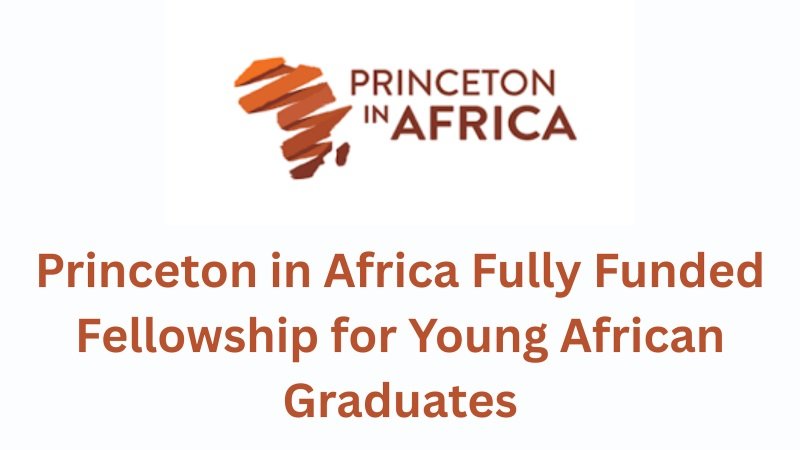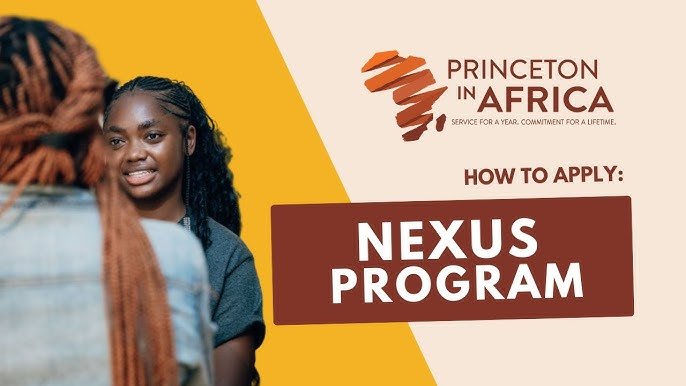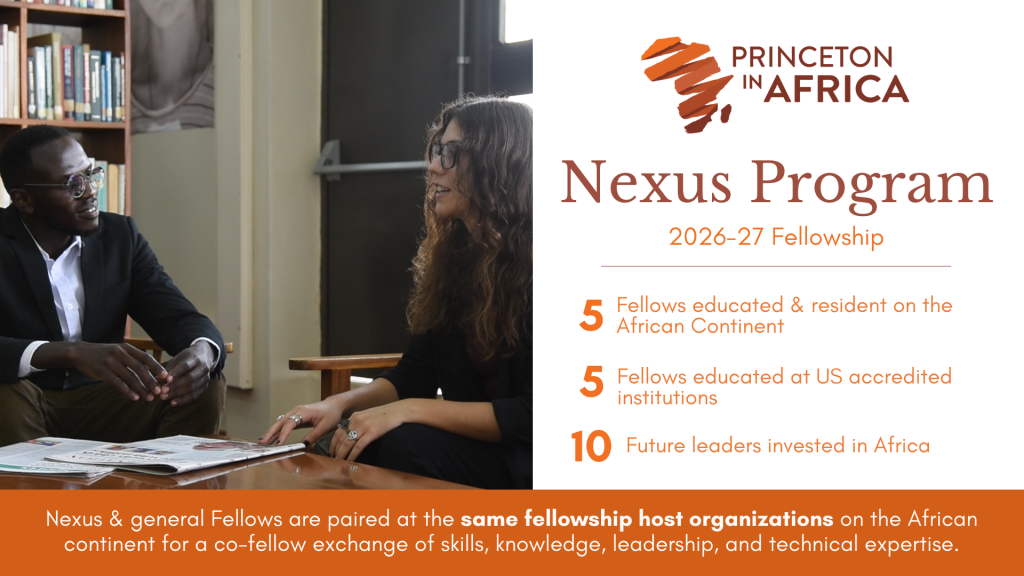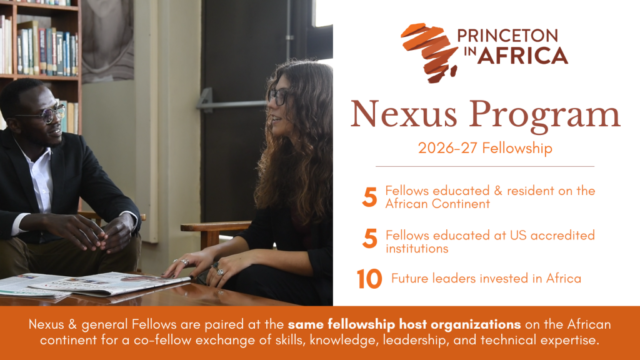In a welcome development for African education leaders and change-makers, Princeton in Africa (PiAf) has officially opened applications for its Nexus Fellowship for the 2026–27 cohort. This initiative, launched a few years back, aims to bridge educational and professional divides by pairing fellows educated in Africa with counterparts trained at U.S.-accredited institutions.
For leaders across the continent seeking to deepen their impact, this fellowship (alongside several other opportunities published on 4 October) offers a gateway to professional growth, network expansion, and meaningful local involvement. Here, we explore the details, advantages, and how to submit an outstanding application.
Table of Contents

What Makes the Nexus Fellowship Special — and What Else Opens on 4 October
At its heart, the Princeton in Africa Nexus Fellowship is a bold experiment in collaboration and reciprocity. Unlike many fellowships that place individuals in isolation, the Nexus model pairs one fellow educated in Africa (a “Nexus Fellow”) with one general-track fellow educated in a U.S.-accredited institution. The two collaborate at the same host organisation over the fellowship year, exchanging perspectives, skills, and leadership styles.
This pairing has multiple benefits. The Nexus Fellow brings deep knowledge of local systems, networks, and contextual realities. The U.S.-educated co-fellow contributes complementary perspectives shaped by different academic traditions. Together, they strengthen each other’s work and that of the host organisation.
Previous host organisations include the African School of Economics (Benin), Emerging Leaders Foundation Africa (Kenya), the International Livestock Research Institute (Kenya), and the International Rescue Committee (in Kenya and Somalia), among others. These placements reflect the diversity of sectors and geographies where fellows might work.
On 4 October, additional fellowship opportunities also surfaced, reflecting the vibrancy of the field for African education and development professionals. While the Nexus Fellowship is among the more high-profile ones, you’ll find complementary openings—perhaps in AI, policy, or social innovation—that can align with your strengths or career goals.
Eligibility, Application Process, and Timeline
If you’re considering applying, here is what you need to know:
Who can apply (Nexus Fellows track):
- You must hold a degree (bachelor’s, master’s, or PhD) from an African university.
- You should be a young professional or, if you’re still studying, in your final undergraduate year (expected to graduate by June 2026).
- You must be no more than 35 years old during the fellowship year (i.e., born on or after September 1, 1991).
- Full professional proficiency in English (CEFR Level C1 or equivalent) is required. For some positions, French is preferred.
- You must hold a valid passport through August 2027.
- You should be a citizen of an African country and currently reside in Africa. (Applicants with dual U.S. citizenship are not eligible.)
- You may not be enrolled in a graduate or doctoral programme during the fellowship period.
Submission requirements:
- All Nexus and general-track applicants use the same base application form.
- Nexus applicants must provide additional documentation, including:
- Proof of undergraduate enrolment or graduation
- Academic transcripts
- At least one recommendation letter
- The closing date for applications for the 2026–27 cohort is 27 October 2025. Late or incomplete submissions will not be considered.
- There is a mandatory virtual orientation for accepted fellows, scheduled for 5–7 June 2026, in real time. This orientation introduces fellows to PiAf staff, to each other, and to essential tools before placements begin.
Why this fellowship matters:
- The program fosters peer learning between fellows educated in different systems.
- Fellows get leadership experience within Africa-based organisations tackling pressing challenges.
- Access to the PiAf alumni network (over 700 professionals) opens doors to global collaboration.
- The dual-fellow structure encourages cross-cultural and cross-disciplinary exchange, strengthening each fellow’s impact.
For full details and to apply, prospective candidates should refer to the official Princeton in Africa website.

Tips to Craft a Winning Application
Because the Nexus Fellowship is competitive, investing effort into your application can set you apart. Here are strategies to strengthen your candidacy:
1. Tailor your motivations and story
Don’t just reproduce a generic cover letter. Share your journey: what challenges you’ve faced in your context, what inspired your leadership path, and how the fellowship aligns with your personal mission. Be specific about why the Nexus model (paired fellowship) is attractive to you.
2. Show ground-level impact and vision
Princeton in Africa will want to see not only past accomplishments, but also future trajectory. Use concrete examples: projects you led, changes you initiated, or community outcomes you influenced. Then articulate how you plan to scale or extend that work with the fellowship’s support.
3. Collaborate and reflect
Since the Nexus model emphasises working with a co-fellow from a different background, it shows openness to collaboration, learning, adaptability, and cross-cultural exchange. Reflect on moments you succeeded (or failed) working in diverse teams.
4. Secure strong recommendations
Choose referees who know you well—ideally, supervisors or mentors who can speak to your leadership, learning agility, and character. Provide them with your statement of purpose or CV so they can contextualise your application for you.
5. Submit a clean, complete dossier before the deadline
Double-check your transcripts, proof of enrolment, passport validity, and recommendation letters. Make sure your application matches all stated requirements. Submit early to avoid last-minute glitches.
The Bigger Picture: Why October 4 Fellowship Opportunities Matter for African Education Leaders
That Princeton in Africa launched its Nexus Fellowship announcements on 4 October—alongside other fellowship postings—underscores something important: the calendar has become a key moment in the African education and development ecosystem.
Each year, waves of calls, scholar programmes, and fellowships drop in early October. For ambitious young professionals, this creates a rhythm of opportunity: evaluate which programmes resonate, prepare strong materials early, and stay alert to deadlines.
For education sector leaders in Nigeria or elsewhere, here are some practical takeaways:
- Curate a shortlist of complementary programmes. You don’t have to apply to every call, but evaluate those aligned with your focus (education policy, edtech, leadership development, research, etc.).
- Build a “library” of core documents. Maintain updated CVs, mission statements, writing samples, and reference contacts. This saves time when deadlines approach.
- Seek networks and peer support. Fellowships like Nexus are about networks. Engage local or online cohorts (e.g. past fellows, peer coaches) to critique and sharpen your application.
- Think long term. Even if you don’t get accepted this year, the process of preparing an application helps you clarify goals, refine your narrative, and position yourself for future cycles.
- Stay disciplined with deadlines. Many promising applicants are eliminated simply due to missing a deadline or submitting incomplete dossiers—don’t let that be you.

Conclusion
As applications open, the Princeton in Africa Nexus Fellowship 2026–27 reminds us that leadership development in Africa works best when it’s collaborative, grounded, and locally relevant. It’s an invitation to young Africans—educators, researchers, and community builders—to rise to global standards while staying rooted in African realities.
If you’re ready to stretch your potential and contribute to Africa’s progress, start today. Explore full details and apply before 27 October 2025 at https://www.princetoninafrica.org/applicants/how-to-apply/.
Join Our Social Media Channels:
WhatsApp: NaijaEyes
Facebook: NaijaEyes
Twitter: NaijaEyes
Instagram: NaijaEyes
TikTok: NaijaEyes
READ THE LATEST EDUCATION NEWS





